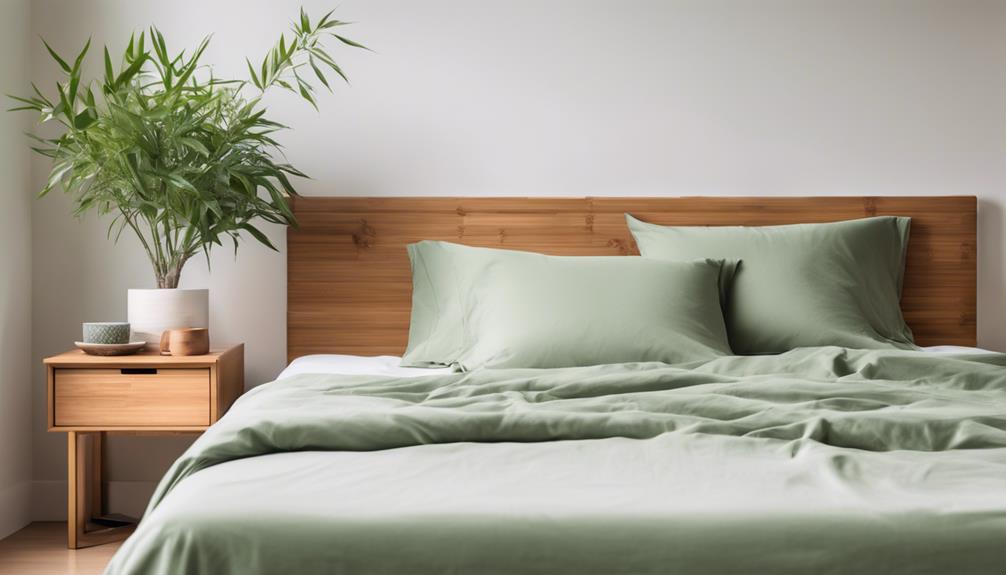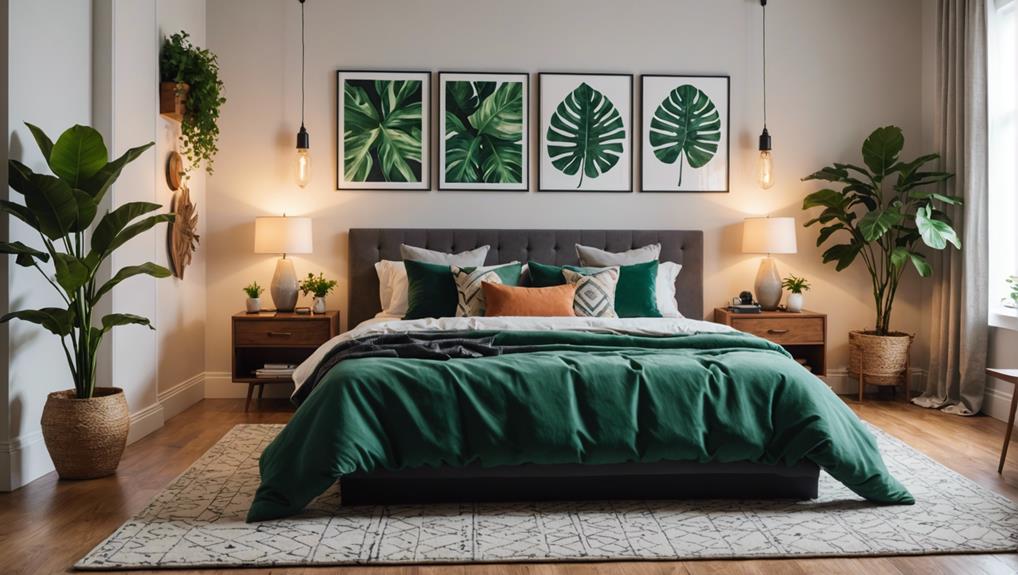
Eco-Luxury Bedding: A Sustainable Sleep Guide
You're on the brink of enhancing your sleep with eco-luxury bedding, where sustainability meets luxury. Crafted from organic materials like bamboo, Tencel™, and linen, these eco-friendly options not only promise a plush sleeping experience but also boast hypoallergenic and moisture-wicking properties. They reduce your ecological footprint by utilizing sustainable manufacturing practices, including the use of eco-friendly dyes and fair trade labor. By embracing bedding made with natural fibers, you'll improve your well-being, support ethical practices, and contribute to a healthier planet. Shifting to sustainable sleep with eco-luxury bedding doesn't mean sacrificing comfort for conscience. Discover how you can make a difference tonight.
Key Takeaways
- Eco-luxury bedding uses organic materials like cotton and bamboo for hypoallergenic and breathable sleep.
- Sustainable manufacturing reduces environmental impact, supporting water conservation and minimizing chemical pollution.
- Materials such as linen and Tencel™ are durable, promoting longevity and reducing the need for frequent replacements.
- Ethical sourcing and fair trade practices ensure social responsibility in the production of eco-luxury bedding.
- Caring for eco-luxury bedding with eco-friendly detergents and cold water washes extends its life and sustainability.
Understanding Eco-Luxury Bedding
Eco-luxury bedding guarantees the best of both worlds, offering you a sleep experience that's not only lavish but also conscientiously sustainable. At the heart of this approach lies the commitment to using organic and eco-friendly fabrics such as organic cotton, linen, and Tencel™. These materials are chosen not just for their minimal environmental impact but also for their superior comfort and durability.
What sets eco-luxury bedding apart is its embrace of sustainable manufacturing practices. This includes the utilization of eco-friendly dyes, which secure that the production process minimizes water pollution and toxic chemical use.
Moreover, the luxury aspect isn't compromised, as these bedding options often feature higher thread counts and premium finishes, enhancing your sleep quality while being gentle on the planet. The ethical production practices extend beyond the materials to include fair trade labor, ensuring that every purchase supports not just environmental sustainability but also social responsibility.
Benefits of Sustainable Materials
Switching to eco-luxury bedding crafted from sustainable materials not only guarantees you're resting on toxin-free fabrics but also greatly reduces your ecological footprint.
You're contributing to a healthier planet by decreasing water and energy consumption, and supporting ethical farming and fair trade practices.
Additionally, the choice promises you a healthier sleep environment by minimizing exposure to harmful chemicals, thereby enhancing your overall well-being.
Healthier Sleep Environment
Creating a healthier sleep environment starts with choosing bedding made from sustainable materials like organic cotton and bamboo, known for their hypoallergenic properties and gentle touch on the skin. These natural fibers not only guarantee your comfort through their breathability and moisture-wicking capabilities, reducing the risk of overheating, but they also minimize your exposure to harmful chemicals and toxins.
This supports your overall well-being, making your sleep space a sanctuary for rest and rejuvenation. By embracing sustainable practices in your bedding choices, you're not just investing in your health; you're also contributing to a cleaner, greener lifestyle.
Sustainable bedding materials offer the added benefits of durability and longevity, promising a long-lasting and comfortable sleep experience without compromising on quality or the environment.
Reduced Environmental Impact
By selecting sustainable materials like organic cotton and linen, you're greatly reducing water usage in production, thereby lessening your environmental footprint. The environmental benefits of these sustainable practices are multifaceted. For instance:
- Using eco-friendly fibers like bamboo and Tencel™ leads to minimized chemical pollution.
- Hemp bedding's growth requires minimal water and pesticides, making it an environmentally sound choice.
- Opting for ethically produced silk bedding supports biodiversity and reduces the ecological footprint.
These choices not only guarantee a luxurious sleep experience but also contribute greatly to environmental conservation efforts. Sustainable bedding options offer a dual advantage of comfort and responsibility towards the planet, making them a wise choice for eco-conscious consumers looking to make a positive impact.
Organic Cotton: A Closer Look
Delving into the world of organic cotton reveals its substantial benefits for both our skin and the planet, offering a sustainable alternative to conventional bedding materials. Unlike its traditional counterparts, organic cotton is grown without harmful pesticides or chemicals. This not only makes it safe for those with sensitive skin but also supports eco-friendly farming and production practices.
Organic cotton's breathability is another feature that sets it apart. This fabric promotes airflow, greatly reducing the risk of overheating during sleep. For individuals with allergies or skin sensitivities, the hypoallergenic nature of organic cotton makes it an ideal choice, ensuring a comfortable and irritation-free sleep environment.
Moreover, by choosing organic cotton bedding, you're contributing to a healthier lifestyle and advocating for a greener, more sustainable world. The production of organic cotton emphasizes the importance of sustainable farming, which in turn reduces our environmental impact.
| Feature | Benefit | Impact |
|---|---|---|
| No harmful chemicals | Safe for sensitive skin | Reduces health risks |
| Breathable | Reduces overheating risk | Improves sleep quality |
| Hypoallergenic | Ideal for allergies and sensitivities | Enhances comfort |
Exploring organic cotton benefits reveals a path towards sustainability and eco-friendly living, making it a superior choice for eco-conscious consumers.
The Wonders of Bamboo Fabric
As you explore eco-friendly options for your bedding, you'll find that bamboo fabric stands out not only for its softness but also for its impressive sustainability.
Grown rapidly without the need for pesticides, bamboo is a champion of sustainable growth practices. Its benefits extend to being antimicrobial, hypoallergenic, and moisture-wicking, ensuring your sleep is both luxurious and environmentally conscious.
Bamboo Fabric Benefits
Exploring the wonders of bamboo fabric reveals its unparalleled benefits for both your sleep and the environment. When you choose bamboo comfort, you're not just opting for a restful night; you're embracing eco-friendly luxury in its purest form. Bamboo fabric stands out because it is:
- Naturally antibacterial and odor-resistant, ensuring your bedding remains fresh longer.
- Highly breathable and moisture-wicking, keeping you cool and comfortable all night.
- Luxuriously soft and silky, providing an unmatched sleep experience.
Moreover, bamboo's hypoallergenic properties make it a sanctuary for sensitive skin, drastically reducing the risk of irritations. This fabric embodies the perfect marriage of sustainability and luxury, making it an essential choice for anyone looking to upgrade their bedding with a clear conscience.
Sustainable Growth Practices
Understanding the sustainable growth practices behind bamboo fabric reveals why it's become a cornerstone of eco-luxury bedding. Bamboo grass flourishes rapidly and rejuvenates itself without needing pesticides or fertilizers, embodying the principles of sustainable farming.
Its production process is particularly eco-friendly, consuming considerably less water than cotton, which underscores its sustainability advantage. The inherent qualities of bamboo fabric, including its antibacterial, hypoallergenic, and moisture-wicking properties, make it an ideal choice for eco-luxury bedding.
Additionally, bamboo fabric's biodegradability minimizes its environmental footprint when its life cycle concludes. The unmatched softness and breathability further enhance its appeal as a luxurious, eco-friendly bedding solution.
This eco-friendly production not only conserves resources but also offers a guilt-free luxury to environmentally conscious consumers.
Linen: Elegance and Sustainability
Linen, derived from the flax plant, combines luxury and sustainability, offering a breathable and durable option for eco-conscious consumers. Its luxurious texture not only elevates your sleep experience but also aligns seamlessly with a lifestyle dedicated to sustainable elegance. The benefits of linen go beyond its aesthetic appeal, making it a standout choice in the domain of eco-luxury bedding.
When you choose linen, you're investing in:
- Durability that saves: Linen bedding becomes softer with each wash and lasts for years, reducing the need for frequent replacements.
- Minimal environmental impact: The production of linen requires much less water compared to other fabrics, making it a champion of eco-friendly practices.
- Health and comfort: With natural antibacterial properties, linen is hypoallergenic, catering to those with sensitive skin and ensuring a cleaner, more comfortable sleep.
Opting for linen bedding isn't just about the allure of its texture or the promise of a luxurious sleep. It's a conscious decision to support sustainable practices without compromising on elegance. Linen's benefits, from its minimal water usage in production to its long-lasting nature, epitomize sustainable elegance, showcasing that luxury and environmental responsibility can go hand in hand.
Discovering Tencels Eco-Friendly Qualities
In the world of eco-luxury bedding, Tencel emerges as a standout fabric, celebrated for its sustainable and skin-friendly properties. This remarkable material, made from wood pulp, showcases the pinnacle of sustainable textiles, offering a green solution without sacrificing comfort or quality. Its production is a paragon of eco-friendliness, utilizing a closed-loop process that recycles solvents, drastically minimizing waste and reducing water usage.
The benefits of Tencel extend beyond its minimal environmental footprint. Additionally, Tencel isn't only biodegradable and compostable, easing the burden on our planet at the end of its lifecycle but also boasts natural moisture-wicking properties. This feature keeps you cool and dry throughout the night, enhancing the quality of your sleep in an eco-conscious manner. Also, its hypoallergenic qualities make it gentle on even the most sensitive skin, ensuring a restful night without irritation.
The detailed exploration of Tencel's eco-friendly qualities reveals its significant role in the shift towards sustainable textiles. Its benefits underscore the importance of choosing materials that support both our well-being and the health of our environment, making Tencel a prime choice for eco-luxury bedding.
The Role of Wool in Eco-Luxury
Exploring the world of eco-luxury bedding, wool stands out for its unparalleled combination of sustainability, comfort, and all-season functionality. You've likely heard of wool's traditional uses, but its role in sustainable luxury bedding might be new to you. Let's delve into why wool is becoming a cornerstone of eco-conscious sleep.
Wool's natural breathability and moisture-wicking properties make it an ideal candidate for bedding that keeps you comfortable regardless of the season. These features contribute greatly to wool's benefits in creating a premium sleep environment that's both luxurious and earth-friendly.
But what sets wool apart in the realm of sustainable luxury?
- Renewability and Biodegradability: Wool isn't just a renewable resource; it's also biodegradable. This means your bedding choice reduces environmental impact from production to disposal.
- All-Season Comfort: Its insulating properties offer warmth in winter while keeping you cool in summer.
- Hypoallergenic Properties: Wool is naturally resistant to dust mites, making it an excellent option for allergy sufferers seeking a luxurious texture and a good night's sleep.
Silk: Luxurious and Sustainable
Silk elevates the concept of eco-luxury bedding with its unparalleled softness, sheen, and sustainable credentials, offering you a sleep experience that's both indulgent and kind to the planet. Harvested from the cocoons of silkworms, silk is a natural protein fiber that not only boasts a luxurious feel but also comes with a host of silk benefits that enhance your sleep quality. Its hypoallergenic properties make it an ideal choice for those with sensitive skin, while its natural resistance to dust mites ensures a cleaner, more hygienic sleep environment.
What sets silk apart in the world of sustainable production is its biodegradability and eco-friendliness. As a natural fiber, silk seamlessly integrates into the ecosystem, leaving minimal environmental footprint. Sustainable silk production takes this a step further by adopting ethical practices including cruelty-free harvesting and ensuring fair labor conditions. This commitment to sustainability extends the silk benefits beyond mere comfort, making it a conscientious choice for those looking to reduce their environmental impact.
Moreover, silk's ability to regulate body temperature provides year-round comfort, keeping you cool in the summer and warm in the winter. This unique trait, coupled with its sustainable production, positions silk as a pinnacle of eco-luxury bedding.
Identifying Greenwashing Tactics
As you explore eco-luxury bedding options, it's important to recognize greenwashing tactics that brands might use to appear more sustainable than they truly are. Spotting misleading eco claims requires a keen eye, especially when terms like 'natural' and 'organic' are used without proper certifications to back them up.
To make sure you're making truly environmentally friendly choices, always verify sustainable certifications and seek transparent information from brands.
Spotting Misleading Eco Claims
Many companies misleadingly use vague eco-friendly terms, making it essential to learn how to spot these greenwashing tactics in eco-luxury bedding. Identifying greenwashing tactics and avoiding misleading claims require vigilance. Words like 'natural' or 'organic' may not always mean the products are sustainable or ethically produced. Similarly, claims of 'biodegradable' or 'eco-friendly' need tangible evidence to hold any weight.
To combat greenwashing, consider these steps:
- Research the brand's sustainability practices for authenticity.
- Look for specific certifications, like GOTS or OEKO-TEX, which weren't discussed in detail here.
- Question vague terms such as 'eco-friendly' without transparent evidence.
Verifying Sustainable Certifications
Now that you've learned to spot misleading eco claims, it's essential to understand how to verify sustainable certifications in eco-luxury bedding. Seeking out specific certifications like Global Organic Textile Standard (GOTS) ensures genuine sustainability. Be wary of vague eco-friendly claims that lack concrete certifications or verifiable standards.
| Certification Type | Purpose | Indicator of |
|---|---|---|
| GOTS | Organic materials, eco-friendly production | Genuine sustainability |
| Fair Trade | Ethical labor, transparent supply chains | Social responsibility |
| Vague Eco Claims | Often lacks specificity | Potential greenwashing |
Understanding certification standards and eco-friendly verification helps you navigate the bedding industry's misleading marketing tactics. It's about making informed choices and supporting ethical labor practices and true environmental stewardship.
Certifications to Trust
When selecting eco-luxury bedding, it's crucial to consider certifications that guarantee ethical, sustainable practices. These certifications aren't just labels; they're assurances that what you're purchasing has a minimal environmental impact and supports ethical sourcing.
- The Global Organic Textile Standard (GOTS) is a top-tier certification for organic textiles. It guarantees that the entire production process, from the harvesting of the raw materials, through environmentally and socially responsible manufacturing, to labeling, provides credible assurance to the end consumer.
- Fair Trade certification goes beyond just the environmental aspects, focusing also on the human element. It ensures that the workers involved in the production of your bedding are paid fair wages and work in safe conditions.
- Lastly, the Greenguard certification ensures that the products you're bringing into your bedroom contribute to healthier indoor air quality by emitting lower levels of chemicals.
Caring for Your Eco-Luxury Bedding
To guarantee your eco-luxury bedding remains in pristine condition and retains its sustainable qualities, it's essential to embrace proper care practices. Incorporating eco-friendly practices into your routine isn't just good for the environment; it also plays a key role in the longevity of your bedding.
Start by choosing eco-friendly detergents free from harsh chemicals. These gentler options are better for both the fabric and the planet. Additionally, washing your bedding in cold water is a simple yet effective way to reduce energy consumption.
Avoiding bleach is another important washing tip to make sure your bedding's sustainability. Bleach can break down the natural fibers of your eco-luxury bedding, shortening its lifespan. Instead, opt for natural stain removers that are less abrasive.
Line drying is a golden rule for preserving the quality of sustainable materials. This method reduces energy consumption significantly compared to using a dryer and helps maintain the fabric's integrity.
Moreover, following the specific care instructions provided with your bedding is crucial. These guidelines are designed to maintain the integrity of your eco-luxury bedding, ensuring it lasts for years. Proper care enhances performance and contributes to a sustainable lifestyle, making your investment in eco-luxury bedding both environmentally beneficial and conducive to a healthier, more luxurious sleep experience.
Top Picks for Eco-Luxury Brands
If you're in search of the perfect blend of luxury and environmental responsibility, brands like Boll & Branch and Coyuchi stand out as top picks for eco-luxury bedding. These brands are at the forefront of combining ethical sourcing with luxury comfort, ensuring that your sleep is both opulent and eco-friendly.
Boll & Branch and Coyuchi have carved a niche for themselves by:
- Prioritizing fair trade practices, ensuring that the people behind their products are compensated fairly and work in safe conditions.
- Utilizing organic and sustainable materials like organic cotton and linen, which not only feel luxurious but also have a minimal environmental footprint.
- Implementing sustainable production processes that reduce environmental impact, supporting eco-conscious consumers in their journey towards a greener lifestyle.
These eco-luxury bedding options are designed with the discerning consumer in mind, one who values both the quality of their sleep and the ethical implications of their purchases. Investing in products from these brands means you're choosing a path that marries luxury comfort with a commitment to the planet and its inhabitants. This way, you're not just sleeping on high-quality bedding; you're also resting easy knowing your choices support ethical and sustainable practices.
Transitioning to Sustainable Sleep
As you contemplate improving your sleep quality, adopting sustainable sleep practices by selecting eco-luxury bedding made from materials like organic cotton, linen, or bamboo becomes an essential step. These materials aren't just kinder to the planet; they're crucial in promoting ethical sourcing and sustainable practices. When you choose bedding with these fabrics, you're supporting ethical farming methods that have a greatly reduced environmental impact.
Transitioning to sustainable sleep isn't just about the material; it's about embracing an eco-friendly lifestyle that contributes to a healthier planet and a better you. Sustainable options prioritize durability, breathability, and comfort without compromising on luxury. By investing in eco-luxury bedding, you're not only ensuring a restful night's sleep but also reducing your carbon footprint and supporting fair trade practices.
Frequently Asked Questions
What Is Eco Bedding Made Of?
Eco bedding's crafted from materials like organic cotton and bamboo, focusing on fabric recycling and the bedding lifecycle. You're supporting sustainable practices that minimize environmental impacts, ensuring your sleep's not just comfortable but eco-conscious too.
What Is the Best Bedding to Sleep In?
The best bedding for you depends on personal comfort and season. Don't fall for thread count myths; focus instead on material quality. Seasonal bedding choices, like lighter fabrics for summer, enhance your sleep experience.
What Is Eco-Friendly Bedding?
Eco-friendly bedding's made from sustainable materials, reducing environmental harm. Beware of greenwashing risks; certification's essential for authenticity. It's about minimal water, energy use, and chemical-free methods, supporting ethical practices for a healthier sleep and planet.
What Kind of Sheets Are the Most Sustainable?
You're curious about the most sustainable sheets? Consider those from hemp or bamboo, known for low water consumption rates and minimal need for pesticides. Also, look for brands offering sheet recycling programs to minimize waste.
Conclusion
In wrapping up, shifting to eco-luxury bedding isn't just a trend; it's a commitment to sustainability and quality sleep. By choosing materials like organic cotton, bamboo, and linen, you're supporting a healthier planet and indulging in unmatched comfort.
Look for trusted certifications to guarantee authenticity, and remember, caring for your eco-friendly bedding properly extends its life. Exploring top eco-luxury brands can kickstart your journey towards sustainable sleep.
Embrace this change, and sleep soundly knowing you're making a difference.



Leave a Reply